Unlike Natsume Yuujinchou itself, I’m not going to be very subtle here. I adore this episode, and not just because it’s our introduction to one of my favorite characters in the series. The main reason I have such a fondness for this episode is because it marks the point when I transitioned from a casual observer to a truly dedicated fan of this series. I know the “three episode rule” has gotten a lot of controversy recently, but I have to admit that it perfectly describes my experience with Natsume Yuujinchou. I hope to explain exactly when and why this is the case in this “review”, so let’s dive right in.
Fake Smiles Hide Real Tears
First, I want to talk about a small moment that I think it is incredibly important to understanding Natsume’s character and sets up the themes of this episode absolutely beautifully. “Have you made any friends here yet?” Touko-san, Natsume’s foster mother, asks him “Have you made any friends here yet?” In reply, Natsume scrunches his face into an unusually bright smile and says lightly, “Yes, everyone is very nice.” However, you don’t have to look or listen very hard to tell that his cheerful tone and smile are painfully forced. I think this simple gesture gives us two important insights into Natusme’s character.

The second notable part of this moment lies in the actual words that Natusme uses–or more accurately in the ones that he doesn’t. “Everyone is very nice,” he says, but he never mentions making a connection with anyone. We know from the brief glimpses that we’re given into his school life that the interactions he has with his classmates are relatively superficial–composed of little pleasantries and quips that most high school students would exchange with their acquaintances in the hall in between classes. It’s implied that everyone notices Natusme and maybe even says “hi” in the hallways. After all, he is a gorgeous transfer student with all sorts of rumors swirling around him. It would be shocking if his classmates were not interested in talking to him. Of course people are “nice” to him–as awful as high schoolers can be, there is a level of societal decency that must be maintained in such a highly regulated social space. But sometimes “nice” is not enough.
We humans have a deep and ignorable desire to feel like we are loved by and important to the people around us. If this innate need for social support is not fulfilled, the resulting sense of isolation and meaninglessness can be extraordinarily crippling. It’s been shown time and time again that its not necessarily how many friendships you have, but rather how meaningful you perceive each of your relationships to be that determines how supported and happy you feel. I have had personal experience with this. As I’ve mentioned several times, Natsume Yuujinchou is an incredibly personal show for me, so I hope you won’t mind if I take a bit to explain how this show connected with me.
I remember that around the time I started watching Natsume Yuujinchou, I felt very socially confused. I was sure that the people I spent time with liked me at least on a basic level, but I had the sense that none of them were truly interested in spending time with me or getting to know who I really was. I noticed that everyone around me made sure to ask me about my day, but at the same time I got the feeling that none of them really cared about what my answer was. I felt like nobody wanted to understand who I was as a person underneath my most obvious character trait. Like Natusme, I couldn’t deny that “everyone was very nice” to me, but at the same time I felt like I didn’t have any true friends that made me lonely. Of course, as I was soon to discover, most of this was entirely in my head, an grossly exaggerated version of reality crafted by my anxiety-prone and over analytical brain.
After awhile, a bunch of my friends noticed how reticent all these thoughts were making me. They reached out to me, and I remember being incredibly touched by their gestures. I made plans to spend quality time with them, and realized that they really did care deeply about me. I discovered that the superficiality that I had perceived in our interactions was mostly because of mental barriers that I myself had erected. The social isolation was at least half my fault–I may have felt alienated from the people around me, but I also hadn’t actively been trying to make a connection. In this way, a vicious cycle developed–I felt a distance growing between my friends and I, so I shut myself off even further to try to lessen the pain of trying to connect and failing. As I drew into myself and chose to spend more time by myself, it limited the opportunities my friends had to have meaningful interactions with me. In other words, I created my own proof that no one cared about me, thus strengthening that misguided belief and driving me into further isolation. It was only when I opened myself up by attempting to make deep and heartfelt social connection that I was able to break this endless spiral.
Natsume’s problem is essentially the same as mine was, and thus I believe his solution is the same as well. He craves human connection beyond the superficialities of everyday interaction, something that his unfortunate circumstances have made it nearly impossible for him to achieve. As far as we know, Natusme has yet to form a real relationship with anyone–a bond marked by a deep understanding and shared values. Unfortunately, at least right now, he is hesitant to admit his problems to his friends, or really tell them anything at all about his life. This is demonstrated perfectly within the first three minutes of the episode, when Natsume’s classmates Nishimura and Kitamoto are trying their best to get him to open up to them. (Bless these boy’s hearts. I love them so much–for reasons that I unfortunately don’t have the time or space to expound upon here. Someday, I promise). “If you’re worried about something, you can talk to us,” offers Kitamoto, playfully slinging his arm around Natusme’s neck. “No,” says Natsume, looking slightly uncomfortable in Kitamoto’s friendly grip.

And as obvious as it is to us the audience that Natusme would be a lot happier if he would just let others into his life, at the same time we completely understand his reluctance. This hesitancy is the second important aspect of Natusme’s character that this bit of dialogue reveals. But this time the truth lies not in the words themselves, but the overly cheerful tone with which Natusme speaks them.
His painfully forced lightheartedness tells us that he is someone who always pretends like he is perfectly happy, even if–and especially if–there’s something deeply troubling him. He would rather shoulder the weight of his problems and sorrows alone then solicit another person’s help. This is a character trait at first appears noble and selfless, but upon closer examination is revealed to be almost selfish in a way and frankly quite unhealthy. It shows a lack of insight. Natsume is so preoccupied by making the lives of his new foster parents as easy as possible, that he never is able to realize that they might want to do the same for him. He has yet to recognize that the same insatiable desire he has to demonstrate kindness towards others may be shared by the people around him–that his foster parents they would actually get more joy out of helping their new, troubled son with his problems than caring for a perfectly healthy child who doesn’t need any looking after. They agreed to take him in because they wanted to help a young child in need–so when Natsume denies them that chance by hiding his tears from them he is actually in a way giving them the opposite of what they most want.
Of course, for a character like Natsume, this lack on insight is perfectly understandable. He’s been ignored, mistreated, and made to feel like burden by almost all of his previous caretakers; his whole life, he’s always been made to feel like he causes more trouble than he’s worth. Therefore, its perfectly understandable that he would be especially wary around the Fujiwaras. After all, their home is the most welcoming and comfortable he has found yet, and he desperately doesn’t want to loose the love and care that they give him. It makes sense that he would assume that nobody else would want to show him kindness, because almost no one ever has for more than a moment. The least uncomfortable households that he stayed in were always the ones in which he caused the least trouble, so over the years he’s come to believe that the only way to find love and acceptance is to not ask for anything or start any problems.

In Natsume’s forced, overly-cheerful smile, we see not only the pain of his past in which he was treated like a burden just for existing, but also the stress and desperation he feels in the present. His past experiences have taught him that he will be abandoned if he makes too much of a disturbance, so he believes that the only way he can remain in the Fujiwaras’ care is if he shows them that he can be a “perfect son”. Thus, he places a huge amount of responsibility and stress on himself, which we can see in his false lighthearted cheerfulness. Of course, through the many episodes of this series, he will come to realize that a true family is supportive, forgiving, and most of all loves conditionally. But he cannot recognize these things yet, because he has never been part of a caring family before. Right now, as we saw in episode one, the youkai are the only beings whom he feels comfortable asking favors from. This is a recurring theme throughout the series: learning that there is no shame in soliciting help from others.
I believe that once Natsume learns to trust others and share his secrets, his pain, and his story with them, he will be on the way to a much happier and more fulfilling life. He will feel like he matters, which is a comfort that I think we all deserve but heartbreakingly enough he has yet to experience. This is because he has never yet encountered someone who can believe in his ability to see spirits, who will look at him with wonder and sympathy instead of doubt and scorn. (Well, he did once before, but we’ll get to that in a moment). Luckily for him, he may just be about to meet one such person. Someone who maybe, just maybe, will be able to appreciate Natsume’s spiritual side. Someone who he can truly talk to without fear of judgement. In other words, his first friend.
I’ve already written at length about the beauty in Natsume and Tanuma’s relationship, and if you’re interested in my thoughts you can read them here.
Finding Emotion in the Mundane
The actual moment when Natusme reveals his secret to Tanuma is like most of the other wonderful aspects of this series: quiet and subtle but yet immensely powerful. This is an incredibly important moment for Natsume’s character–for the first time in his life, he is able to tell someone else about his life with the youkai and be met with genuine understanding instead of dubious contempt. However, Natsume Yuujinchou does not try to cram the emotion of this scene down our throats with schmaltzy music, excessive internal monologuing, or any of the other cheap tricks so often used to telegraph to the audience: “Hey! We want you to be FEELING EMOTIONS right now so please do us a huge favor and feel them.” Instead, the moment plays out very much like it would in real life–just a quiet moment shared by two boys in the hallway of their high school. In a way, this is a daring move for the show–the format of the scene doesn’t make it easy for the audience to deduce that this is an incredibly important and emotional moment for these characters, and thus risks the possibility that we might not feel anything. But I believe that this is very unlikely, because the rest of the episode has done such a fantastic job of showing us the emotions and explaining the backstory that make this scene so much more than a simple conversation between friends.
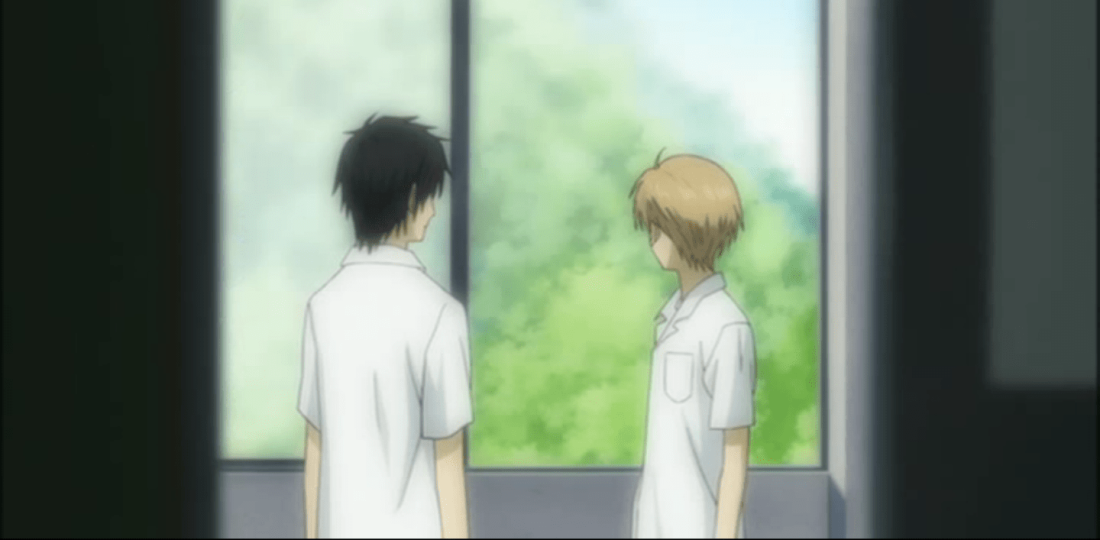
We have all the information that we need to fully appreciate the scene, and Natsume Yuujinchou trusts that we are insightful and intelligent enough to figure everything out ourselves without heavy-handed flashbacks to prompt us. This is one of the many things that I appreciate about this series: it knows we as an audience are intelligent and that we want to conclude and experience things for ourselves, not have somebody else tell us how we are supposed to interpret a specific scene. Don’t get me wrong, I believe melodrama and exaggerated feeling are an equally valid form of art and I enjoy them as much as the next person, but it’s hard not to shower praise on subtle, quiet realism and how perfectly it suits a show like Natsume Yuujinchou. This approach ensures that any emotion comes across as genuine rather than forced, despite the fact that–as I hope to demonstrate through my exploration of all the scenes leading up to this pivotal moment–it was orchestrated with extraordinary care. I believe that the reason why this simple scene works so well is that the show provides us with two layers of background information: one in the past and one in the present.
Calling Names
Let’s start with the present first. As an audience, we are unlikely to be significantly affected by the Natsume’s first interaction with Tanuma if we do not have an understanding just how desperately he wants to tell another human about his secret, and how painful it is for him that no one around him has ever been able to understand him. However, Natsume Yuujinchou doesn’t just spoon-feed us this information through dialogue; rather, it lets us infer how Natsume feels from the ways in which thinks and behaves throughout the episode. I believe that this subtle approach is much more effective than a more blatant one would be because it both allows us to get a better grasp of the depth of Natsume’s emotional pain and gives us examples of how that inner turmoil might affect his everyday life.
One of the best examples of this becomes a reoccurring theme throughout the episode. Every time Natusme hears about the “human who exterminates youkai”, he makes it clear that his sympathies lie with the human doing the damage, not with the spirits that are being harmed. “Do you think they hate you?” he asks the youkai. “Maybe they could never get along with people because they were always distracted by youkai. I could understand that.” This line of dialogue makes it perfectly clear why Natusme would choose to side with humans over the youkai. Although both beings have caused him a significant amount of distress, Natsume has always believed that he wouldn’t be so mistreated by the human world if he wasn’t involved with the spiritual one. In other words, he believes humanity to be innocent and instead blames the youkai for all of his suffering, at the hands of both human and nonhuman tormentors. Although he himself may be too passive and gentle to kill a malignant youkai, Natsume can fully understand and empathize with the anger, sorrow, and frustration that might cause another in his situation to do just that.

Of course, because he is a sweetheart and an angel, after witnessing the extent of the harm being inflicting on the youkai, Natsume begins doubt his initial sympathy for the human exterminator. “If he can see them…how can he do these horrible things?” he wonders. But despite this, Natusme is still so desperate for another human to understand him that he is willing to overlook the potentially vicious side of this hypothetical companion. We can see this perfectly in perhaps the most heartwarming moment of this episode, which is also the moment that I think is most crucial to the successful execution of the final scene when the two boys speak for the first time.

I’m talking about the scene in Yatsuhara when the two Chukyuu (the mid-level youkai who are infatuated with Natusme) command Misuzu to “punish” the human exterminator. Natusme has already decided that the exterminator is probably
Tanuma. When he realizes that Tanuma’s life may be in serious danger, Natsume panics and desperately tries to stop Misuzu from harming him. The extent of Natsume’s concern for Tanuma is truly astonishing, and it becomes clear to the audience that Tanuma’s wellbeing is incredibly important to Natsume. Natsume even goes so far as to use Misuzu’s name to control him, something that he almost never does. In fact–and I could totally be wrong about this–but I think this might be the only time that Natsume ever uses the name of a youkai. It’s a concept that he is clearly uncomfortable with and makes a point to stay away from as much as possible. The fact that he is willing to resort to using the Book of Friends’s power shows the incredible extent of his concern for Tanuma.
This makes sense: Natsume knows that Tanuma is around his same age, goes to his school, can probably see youkai, and seems rather eager to meet him. As such, this makes Tanuma an almost perfect candidate for a new friend for Natusme, perhaps even a friend with whom he can share his most burdensome and also most protected secret. However, it is crucial to note that Natsume has never actually spoken to Tanuma before, or even gotten more than a brief glimpse of him. Therefore, in this moment Natsume is not necessarily scared of losing Tanuma as a person, but rather terrified by the concept that he might be losing the only person who would possibly be able to partake in the spirit would with him. He has no relationship with Tanuma yet, so in this moment his fear is not for his friend. Instead, he fears for himself, that he might be letting his only chance at an intimate, no-secrets, relationship slip away.
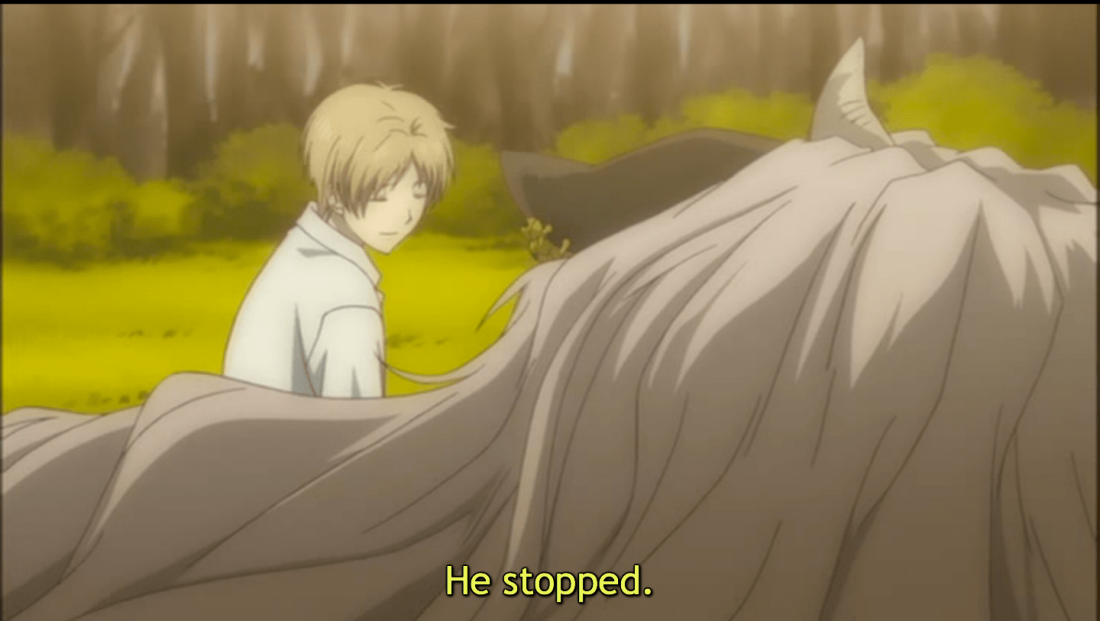
In this moment, we see just how desperately Natsume wants a friend who can understand him, who will be able to accept and appreciate him for who he is, whom he won’t have to hide anything from. The result is that, by the time the scene with Tanuma arrives, we are deeply invested in Natsume’s ability to make a friend. We understand how much a successful connection would mean him, and–perhaps more importantly–how devastating a rejection would be. And because we now know how high the stakes are in this situation, we are more in tune to the deep emotions that lie beneath the surface of this misleadingly mundane interaction.
How to Write a Great Flashback Sequence
The second layer of backstory that helps us understand the scene were Natsume reveals his secret to Tanuma is quite literally that–backstory in the form of a flashback. Flashbacks are shifty creatures–at best, they are fascinating, emotional, and unbelievably impactful; at worst, they are lazy, boring, and painfully awkward. Luckily, at least in my opinion, the flashback in this episode is executed absolutely brilliantly in a number of different ways.
To understand why this flashback works so well, we must first examine it as its own story. What actually happens is relatively simple: A young Natsume encounters a strange woman at a playground who accepts the fact that he can see spirits without any questions or judgement. It’s never explicitly stated, but it is heavily implied that the reason this woman is so accepting of Natsume’s strange ability is that she herself can see youkai. Once little Natsume figures this out, he is overjoyed. After years of searching for a place to belong and only being met rejection, he’s finally found someone to bond with whom he doesn’t have to hide anything from. “So I’m not strange, right? And I’m not alone?” he asks her, eyes shining. We can tell from how hopeful, how desperate he sounds just how much this boy wants and needs a token of acceptance from another human. After being shamed into pretending to be someone he’s not for most of his life, he truly believes he’s found someone whom he can be himself around.
Which makes it absolutely devastating when a elderly neighbor of Natsume’s passes by the park and asks, “Why are you sitting there all by yourself?”
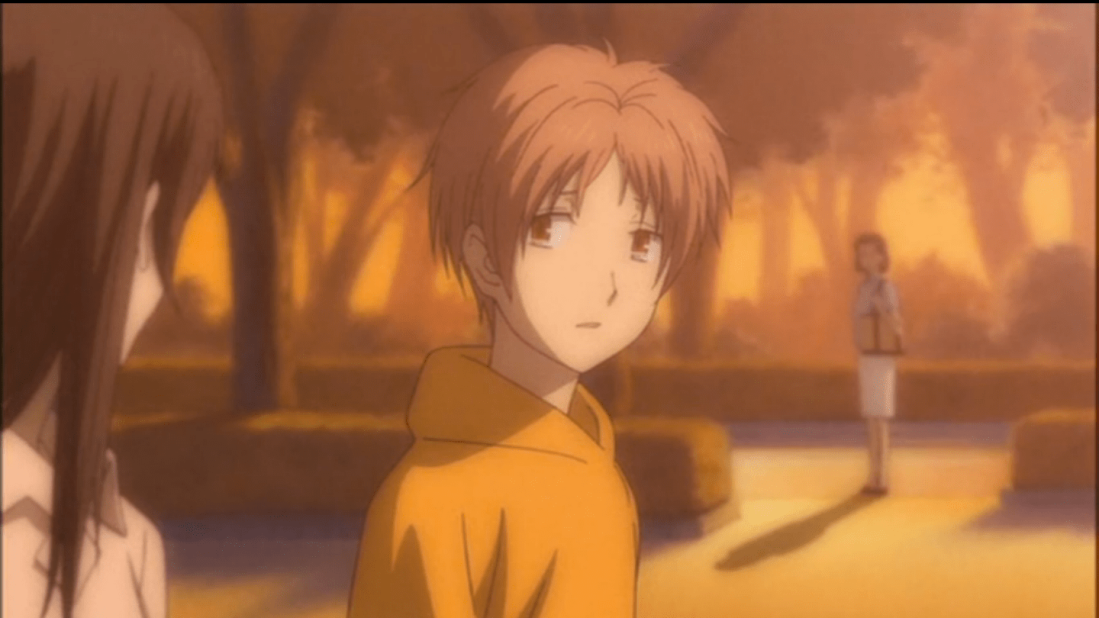
This was it. This was the moment when I decided that Natsume Yuujinchou was more than just a show had decided to start watching because I liked the picture of the pretty boy and the cute cat on the cover. The moment when I stopped critically debating whether I liked this series and started actively loving it. I could feel my fate being sealed: in this moment I pretty much knew that this show was going to become an obsession of mine.
This moment broke my heart and made my stomach drop, and I think it is mostly because of the abruptness of it. Up until this point, we–along with Natsume–have been convinced that this woman is a human being with an ability to see spirits. Which is why, when her true identity is accidentally revealed by a well-meaning neighbor, the shock, betrayal, and crushing loneliness that Natsume feels becomes our own. We were tricked by this youkai too, after all. This really forces us to experience the emotions Natsume is feeling and thus deepens our understanding of his character. We can bring these insights along with us as we view the rest of the episode, and thus start to understand why Natsume is as reluctant, timid, and shy as he is.
This is another thing I adore about Natsume’s character. He’s not just quiet and shy because it makes him cute or because it’s a lazy way to endear him to the audience. Although it may at first appear that way, over time we come to learn that his timidness comes from a tragic past that has left him almost completely broken inside. At first, I’ll admit I was a bit frustrated with his reluctance to open up to others. “Why can’t he see that his life will be so much better if he can just trust that the people around him care for him?” I asked. But after this scene, I started to understand. He’s been tricked, betrayed, and used by both youkai and humans before, so it’s no wonder that he decided it would be better to keep others at a difference. Letting others into his heart has only caused him pain before, so it makes perfect sense that he would be nervous about telling Tanuma his secret for the first time.
After some thought, I decided that it’s primarily the similarity between the events of the past and the events of the present that make the flashback method of storytelling work so well for this particular episode. First, it makes the transitions between the past and present seem natural and organic, which I believe is always a must in this kind of nonlinear storytelling. If a character suddenly begins reflecting on his or her past without any occurrence in the present catalyzing that recollection, it can feel like disconnected, arbitrary, and lazy writing. As an audience member, I want to have at least some idea of why I am being shown a scene from a character’s past, otherwise I get a sense of incoherency and confusion. Thankfully, in this episode, it makes absolutely perfect sense why Natsume is remembering his past encounter with the youkai. He is being confronted with the possibility of a friendship with someone who claims they can see youkai, so it is expected that this situation would remind him of a strikingly similar encounter he had in the past. As the episode flowed smoothly between the past and present, I never once got lost, and began enjoying the experience created by combining both stories together, almost as if they were functioning as one narrative.

I believe it’s this juxtaposition of Natsume’s current attempt to form a friendship with Tanuma and his past failure to make a connection with the youkai “woman” is a large part of what makes the scene where Natsume and Tanuma meet for the first time so impactful. By experiencing the tragedy that resulted the last time Natsume attempted to share his secret with someone who claimed they could see youkai, we gain a deeper appreciation of just how brave he has to be to try the same thing again. And since we know about the failures of the past, we also get a better understanding of just how rare, meaningful, and special the bond that Tanuma and Natsume share is. Finally, this combination of past and present is a perfect example of the beauty of one of Natsume Yuujinchou’s most important overall themes: a tragic past doesn’t mean that the present and future can’t be full of wonder, and hope. In fact, sometimes remembering the sad times you’ve been through can make the joy of the present even more beautiful.
And now for some smaller things that are just for fun:
- Am I the only one who was reminded of a certain scene in Bakemonogatari during this scene? It probably doesn’t help that both Natsume Yuujinchou and Bakemonogatari have protagonists voiced by Hiroshi Kamiya.

“It’s pretty rare for you to take an interest in someone else.” 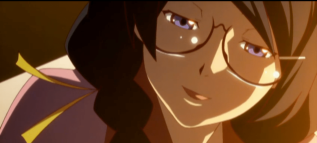
“It’s not like you…For you to have an interest in someone else” - “Your breath reeks of liquor–stay away!” Natsume says and cringes visibly when Nyanko-sensei climbs into his futon after a night of drinking. Of course, the smell of sake on a cat’s breath can’t be pleasant, but Natsume seems especially repulsed, clapping a hand over his mouth and nose and scrunching his eyes. Later on in the series, it is heavily implied that Natsume was abused by alcoholic foster parents during several points of his childhood. It may be an inconsequential detail that I am reading too much into, but it seems to me that Natsume’s violent aversion to the smell of alcohol could be a remnant of the awful experiences he’s had with the substance in the past. After all, it is believed that smell is the sense most strongly connected to the formation and recollection of memories. Little details like this are precisely what make Natsume Yuujinchou such a beautifully tragic experience, as they really drive home how just how much Natsume’s past has tormented him, and how long his road to complete recovery will be.
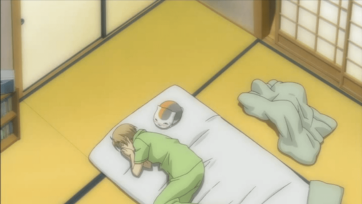
- Misuzu is an extraordinarily powerful youkai, and one that a young and inexperienced boy facing the spirit world alone could certainly benefit from having on his side. The first time Natsume and Misuzu meet, the youkai explains that he is indebted to the Natsume because earlier the boy had freed one of his servants, a frog, from the clutches of Nyanko-sensei. “Being good always pays off, doesn’t it Natsume?” Nyanko-sensei says slyly, to which Natsume scoffs, “You shut up, Sensei.” I love this small addition to the storyline, as it implies that Nyanko-sensei might have cunningly orchestrated Misuzu’s involvement with the situation. It could very well be the case that Nyanko-sensei cleverly took Misuzu’s frog-servant hostage and then presented him to Natsume, assuming that the kind-hearted boy would immediately set him free. However, we can’t say for sure whether Nyanko’s actions were deliberate, or if he merely captured a nearby frog on a drunken whim and it was a happy coincidence that it happened to also be Misuzu’s servant.

“I brought you a present!” I think it’s these moments of mystery that make Nyanko-sensei such an intriguing character. Sure, he’s cute and goofy, but every once in a while we get a glimpse of a being who is exceptionally powerful, smart, and dangerous. Likewise, he claims that he is only bound to Natsume by a contract, and freely admits that he couldn’t care less if the boy succeeds or fails, lives or dies. But every now and then, we get the sense that this cat-demon might indeed harbor genuine affection for his human companion. Of course, Nyanko always has a ready excuse for any remotely kind or helpful actions, and always is eager to explain how his actions are actually self-interested and have nothing to do with love, so for all we know he really could be nothing but a cold-hearted demon. I hope to explore this idea more fully in a future episode discussion (when it is featured as a more prominent focus of the plot), but for now I’ll just say I think it’s the so-called secret sauce that elevates Nyanko-sensei from your typical comic-relief mascot into a legitimately brilliant character.
What do you think? Did Nyanko involve Misuzu on purpose, or was it merely a lucky coincidence? Honestly, I think it could be argued both ways, so I’d be interested in hearing what you think.